Nothing is forever. Especially when it comes to running a multi-billion-dollar public company. This week, in a Fortt Knox podcast special, we're going to do a little retrospective … interviews with CEOs who, for now at least, are no longer CEOs.
I've been doing this podcast for more than a year and a half, so I've sat down with dozens and dozens of top executives, founders and entrepreneurs. Inevitably, change happens. Sometimes the company's board of directors wants a new strategic direction. Sometimes power struggles erupt. Sometimes personal failings come to light.
This time, the lessons from the highest achievers come with an asterisk. Just because you reach the top of an organization doesn't mean you'll stay there. I would add another: Just because these execs are no longer in their old jobs, don't assume they're done. When Steve Jobs was shoved out of Apple in the '80s, he went on to found NeXT, build Pixar, and return to Apple. Mark Hurd was ushered out of HP and landed what turned out to be a better gig at Oracle.
We start with Brian Krzanich, who was CEO at Intel until three weeks ago. That's when Intel's board of directors learned he'd had a relationship with an Intel employee that violated company policy. I got to know Krzanich when he took over the CEO job from Paul Otellini. Brian likes to be called BK, and I quickly learned that he's most comfortable holding onto his identity as an engineer rather than thinking of himself as a corporate executive. The most memorable part of my conversation with him in January 2017: When he revealed a different kind of mistake earlier in his career that almost cost him his job at Intel.
Mark Fields is another executive who'd spent a long time at his company and climbed to the top before his exit. The bottom line on his departure: The stock wasn't doing well, and some within the company lost patience. Fields was in the CEO seat about three years, and my CNBC colleague Jim Cramer thinks he wasn't given enough time to really make his mark. When Mark and I talked in April of last year about his path to the top of Ford, he said he developed a reputation for volunteering to tackle big problems:
Speaking of boardroom drama, Qualcomm right now has one of the most dizzying situations in techland. The company's locked in a legal battle with Apple over patent payments, it just fended off a hostile takeover attempt from rival Broadcom with an assist from the U.S. federal government, and former CEO and chairman Paul Jacobs – the son of founder Irwin Jacobs – left the board and is trying to raise money to take the company private. Paul Jacobs sat down with me in June of last year and talked about his commitment to Qualcomm. If you think he might give up his fight where the company's concerned, just listen to this:
Sir Martin Sorrell built WPP by putting together various ad firms and PR businesses into an empire the likes of which the industry had never seen. He resigned from the company in April with allegations swirling about personal misconduct and misuse of company resources. He has denied those allegations, and is in the process of relaunching his career with a new venture called S4 Capital.
Hosted by Simplecast, an AdsWizz company. See pcm.adswizz.com for information about our collection and use of personal data for advertising.







































